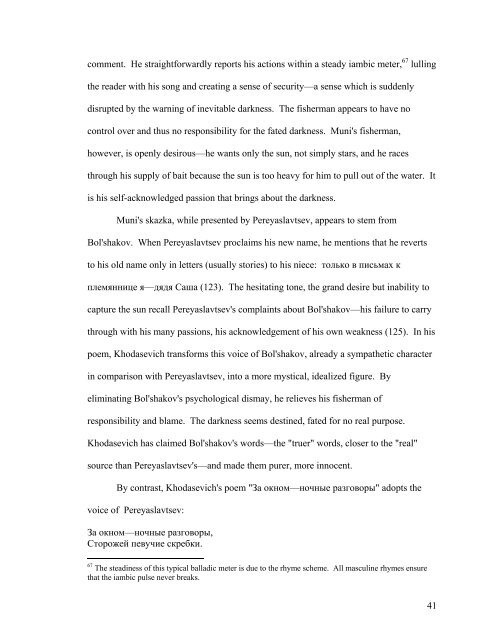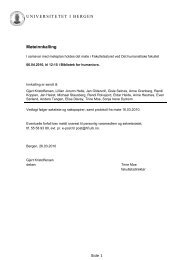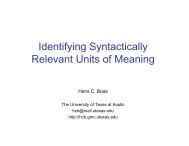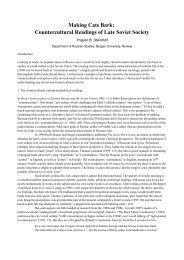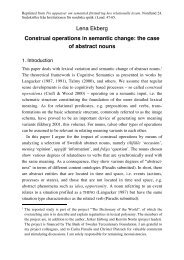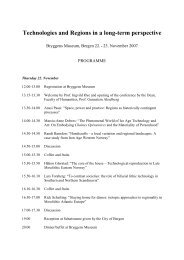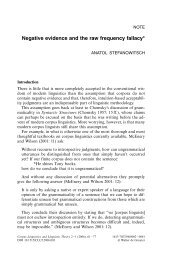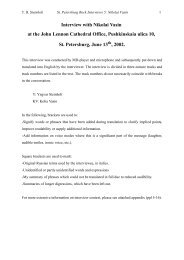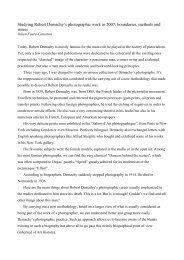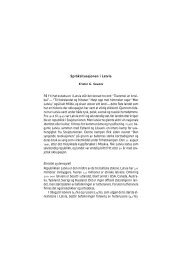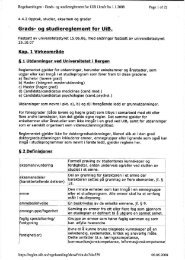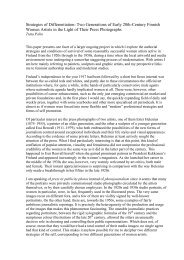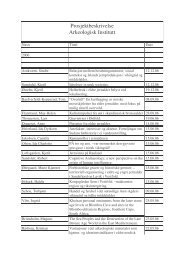THE BOOK OF POEMS IN TWENTIETH-CENTURY ... - TopReferat
THE BOOK OF POEMS IN TWENTIETH-CENTURY ... - TopReferat
THE BOOK OF POEMS IN TWENTIETH-CENTURY ... - TopReferat
Create successful ePaper yourself
Turn your PDF publications into a flip-book with our unique Google optimized e-Paper software.
comment. He straightforwardly reports his actions within a steady iambic meter, 67 lulling<br />
the reader with his song and creating a sense of security—a sense which is suddenly<br />
disrupted by the warning of inevitable darkness. The fisherman appears to have no<br />
control over and thus no responsibility for the fated darkness. Muni's fisherman,<br />
however, is openly desirous—he wants only the sun, not simply stars, and he races<br />
through his supply of bait because the sun is too heavy for him to pull out of the water. It<br />
is his self-acknowledged passion that brings about the darkness.<br />
Muni's skazka, while presented by Pereyaslavtsev, appears to stem from<br />
Bol'shakov. When Pereyaslavtsev proclaims his new name, he mentions that he reverts<br />
to his old name only in letters (usually stories) to his niece: только в письмах к<br />
племяннице я—дядя Саша (123). The hesitating tone, the grand desire but inability to<br />
capture the sun recall Pereyaslavtsev's complaints about Bol'shakov—his failure to carry<br />
through with his many passions, his acknowledgement of his own weakness (125). In his<br />
poem, Khodasevich transforms this voice of Bol'shakov, already a sympathetic character<br />
in comparison with Pereyaslavtsev, into a more mystical, idealized figure. By<br />
eliminating Bol'shakov's psychological dismay, he relieves his fisherman of<br />
responsibility and blame. The darkness seems destined, fated for no real purpose.<br />
Khodasevich has claimed Bol'shakov's words—the "truer" words, closer to the "real"<br />
source than Pereyaslavtsev's—and made them purer, more innocent.<br />
By contrast, Khodasevich's poem "За окном—ночные разговоры" adopts the<br />
voice of Pereyaslavtsev:<br />
За окном—ночные разговоры,<br />
Сторожей певучие скребки.<br />
67 The steadiness of this typical balladic meter is due to the rhyme scheme. All masculine rhymes ensure<br />
that the iambic pulse never breaks.<br />
41


